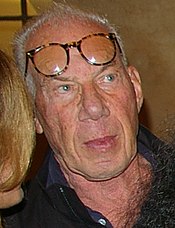Bob Rafelson
Robert "Bob" Rafelson (born February 21, 1933) is an American film director, writer and producer. He is regarded as one of the founders of the New Hollywood movement in the 1970s. Among his best-known films are Five Easy Pieces (1970), The King of Marvin Gardens (1972), and The Postman Always Rings Twice (1981). He was also one of the creators of the pop group and TV series The Monkees with Raybert/BBS Productions partner Bert Schneider. His first wife was the production designer Toby Carr Rafelson. His eldest son is songwriter Peter Rafelson, who co-wrote the hit song "Open Your Heart" for Madonna.
Rafelson was born to a Jewish family in New York City, the son of a hat ribbon manufacturer. His uncle was screenwriter and playwright Samson Raphaelson, the author of The Jazz Singer, who wrote nine films for director Ernst Lubitsch. "Samson took an interest in my work," Rafelson told critic David Thomson. "If he liked a picture, then I was his favorite nephew. But if he didn't like it, I was a distant cousin!" Rafelson had an older brother, Donald, and attended Trinity-Pawling School on scholarship.
As a teenager he would often run away from home to pursue a more adventurous lifestyle, including riding in a rodeo in Arizona and playing in a jazz band in Acapulco. After studying philosophy at Dartmouth College (where he had made friends with screenwriter Buck Henry), Rafelson was drafted into the U.S. Army and stationed in Japan. In Japan he worked as a disk jockey, translated Japanese films and was an adviser to the Shochiku Film Company as to what films would be financially successful in the United States. In an interview with critic Peter Tonguette, he said he was fascinated by the films he saw in Japan: "I'd have to watch an Ozu movie over and over again--say, Tokyo Story--and I was hypnotized by the stillness of his frames, his sureness of composition," he said. "So I suppose my own aesthetic evolved from looking at certain kinds of pictures--Bergman and Ozu and John Ford, if you will."
...
Wikipedia

